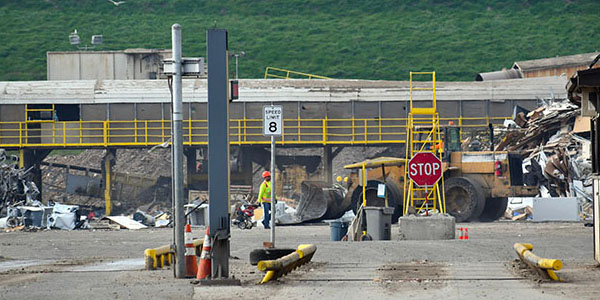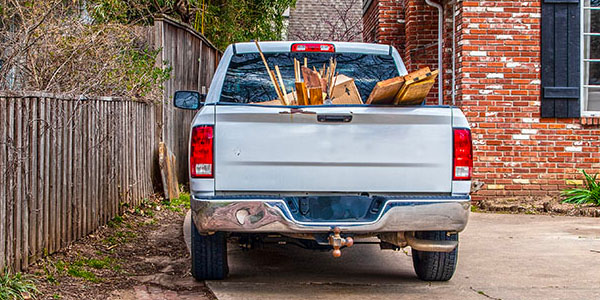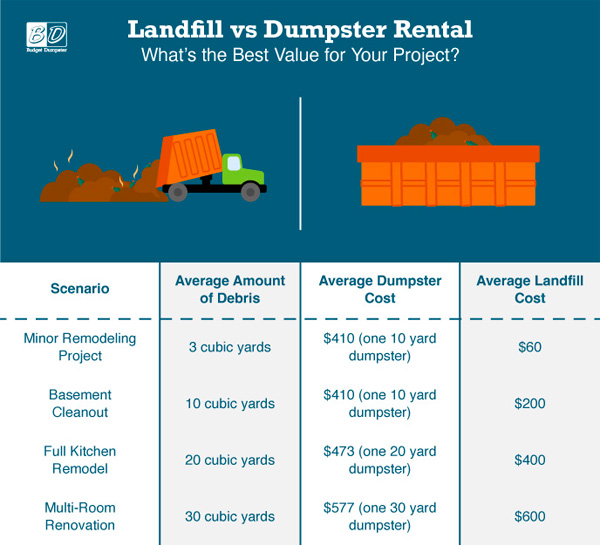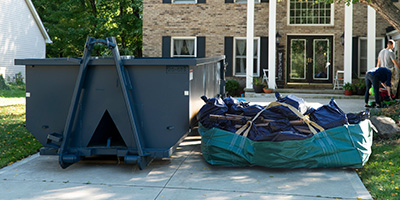Is It Better to Take Trash to the Dump or Rent a Dumpster?

Haul Trash to the Landfill or Rent a Dumpster?
Between time, labor and the amount of material you’re disposing of, cleaning up after a project can be a big task. As your debris quickly piles up, you’ll have to decide how to get rid of it. We break down the process of hauling trash to the landfill to help you decide if it’s the best disposal option for your project.
Taking Trash to the Dump
Where can you take trash? There are several ways to get rid of your project debris. Hauling trash to the landfill yourself is one option you may consider. Before deciding, ask yourself these questions.
Is There a Dump Near Me?
First, you’ll need to find out if there’s a landfill nearby. Most counties have a landfill, but if there isn’t one near you, travel costs can add up quickly, especially if you need multiple trips to get rid of your trash.
What Is a Landfill?
A landfill — also called a dump — is a site used to contain waste. The government regulates modern landfills to prevent contamination of the environment.
Landfills layer waste several hundred feet into the ground to let materials decompose. Clay and plastic layers help remove toxins from the trash. They also prevent leaks from contaminating groundwater.
Landfills require significant resources to operate, so that’s why it’s never free to dispose of waste. Your vehicle and materials will be weighed on a scale when you enter and exit the landfill to determine how much you have to pay.
Are There Different Types of Landfills?
Yes, there are different types of dumps that accept various materials. Knowing the difference between these landfills will help you understand why your curbside trash service prohibits some items.
Municipal solid waste (MSW) landfills are the most common type of landfill. They accept household and nonhazardous waste. You can find everything from food waste to old clothing in an MSW landfill. Chances are, this is the type of landfill you’ll use to dump your trash.
Construction and demolition (C&D) landfills receive common demolition waste and excavated materials such as concrete and building components. This type of waste usually comes from construction projects and large renovations. C&D landfills don’t accept industrial solid waste.
Hazardous waste landfills dispose of materials that are hazardous to human health and the environment. Since these materials need special handling, they come with more expensive disposal costs. If there’s an item you know you can’t throw in a conventional garbage can, take it to a hazardous waste facility.
What Is a Waste Transfer Station?
A waste transfer station is a facility where municipal solid waste is dropped off, sorted and compacted before moving onto a landfill or other final disposal site. Workers sort the waste to screen for hazardous or prohibited items and sometimes recyclables.
While waste transfer stations are primarily used by commercial haulers to drop off waste, some are also open to residents. They are most popular in urban areas. Similar to a landfill, your vehicle and materials will be weighed on a scale to determine the cost.

Can I Take Trash to the Dump Myself?
Most landfills are open to the public, but some are strictly for commercial use. Landfills sometimes vary based on accepted materials, so make sure the landfill you choose can take your trash. You can take most household and nonhazardous waste to an MSW landfill.
Do not try to take your trash to a closed landfill. While these facilities may be operating to be monitored and maintained, they no longer accept waste. If you’re not sure if a landfill is closed, contact your local solid waste management division.

What Vehicle Am I Going to Use? How Much Can It Haul?
Pickup trucks are the most practical personal vehicle to take trash to the dump. Most standard pickup trucks can safely haul 1,000 pounds. Check your truck’s Gross Vehicle Weight Rating to determine how much you can haul. While landfills usually accept cars and SUVs, they aren’t practical for large loads and potentially leaky waste.
Alternatively, you may consider renting a garbage trailer. These are containers with high sides that you can tow behind a pickup truck. Garbage trailer rentals can usually haul more than a personal vehicle, but require rental fees and potential permit fees. Consider those costs in addition to the landfill fees before you rent one.
Depending on where you live, there may be regulations that ensure safe waste transportation. In California, you must cover your load when taking things to the dump to prevent items from falling out onto the road. Some regions require a permit to transport certain materials and quantities of waste. Make sure you know your region’s specific laws ahead of time.
How Much Does It Cost to Go to the Dump?
The exact cost to go to the dump will depend on the rates charged by your area landfill and how their pricing structure works. There’s no way to know exactly what you’ll pay ahead of time, but you can reach out to your local landfill and ask how they charge. Landfills typically charge by weight, but their rates can work in a few different ways.
- Charging a fee per load, with a “load” defined as a predetermined weight of debris.
Example: $60 for every 200 pounds. - Charging a base fee up to a certain weight, followed by an additional fee for each pound over the base weight.
Example: $100 for the first 200 pounds; 10 cents per pound after that. - Charging a fee per pound of debris.
Example: 10 cents per pound.
Renting a Dumpster vs. Taking Trash to the Dump
Hauling trash to the landfill yourself might be worth the effort if you’re dealing with less than 1,000 pounds of debris. However, renting a dumpster is another way to get rid of trash with a larger hauling capacity and a flat-rate price.
Dumpster rental service is better for anyone tackling a larger project or who can’t spare the time to make multiple trips to the dump.
In the following tables, we’ll compare hauling capacity and the cheapest way to dispose of waste between the two options.
Hauling Capacity
To give you a better sense of what each option can haul, the chart below shows how many dumpsters or pickup truckloads you need for the average amount of debris produced by a few common home projects.
Project | Dumpsters | Pickup Truckloads |
|---|---|---|
Household Junk Removal | One 10 yard dumpster | Three to four pickup truckloads |
Room Remodel | One 20 yard dumpster | Six pickup truckloads |
Multi-Room Renovation | One 30 yard dumpster | Nine pickup truckloads |
*Note: weight limits vary by location. Research specifics in your area before making a decision.

“The smallest hauling capacity of a roll-off container is 10 cubic yards and the largest container typically offered is 40 cubic yards. Ten tons is typically the maximum weight limit we can haul.”
Jack Hones, Budget Dumpster
Price Comparison
The following infographic compares dumpster rental and landfill expenses. Landfill costs don’t take into account the costs of gas or trailer or truck rentals, if needed.

Check Out Dumpsters Near You
Weighing the Pros and Cons
Renting a Dumpster
Pros | Cons |
|---|---|
Fill your dumpster as you work without taking trips to the dump. | There may be more restrictions on what types of items you can dispose of. |
Dropped off to fit your schedule and keep it throughout your cleanup. | Takes up space in your driveway or jobsite. |
Choose from several dumpster sizes that can haul up to 20,000 pounds. | Smallest size is 10 yards or a 2,000-pound, which could be more than you need. |
Delivered to your location and someone else haul away your debris for you. | May need to pay for a permit if keeping the bin in the street. |
Hauling Trash to the Landfill
Pros | Cons |
|---|---|
Inexpensive for small amounts of debris. | Multiple trips to the dump if you have more than 1,000 pounds of debris. |
Won’t take up extra space in your driveway. | Can be physically demanding loading and unloading. |
No rental period to worry about. | Must take trips during landfill operating hours. |
Have dumpster rental questions? Check out everything you need to know with our guide!
Renting a Dumpster vs. Getting Rid of Trash Yourself: What’s Best for Your Project?
For any project with more than a couple of pickup truckloads of debris, a dumpster rental will save you time and effort. It will also give you peace of mind knowing the final cost upfront.
Taking trash to the dump yourself is reasonable if you have a small number of truckloads of trash to get rid of, don’t mind pausing your work to make more than one trip and are comfortable with not knowing the total disposal cost ahead of time.

“For anything more than a pickup truckload, I would suggest renting a dumpster. Landfill lines can often be lengthy and they aren’t always in the most convenient locations. Anyone with time constraints or trying to fill a container while working on other projects in their home should rent a container for ease of use alone.”
Jack Hones, Budget Dumpster
If you’re considering a dumpster rental, get a free customized quote to learn about available sizes and pricing in your area.



